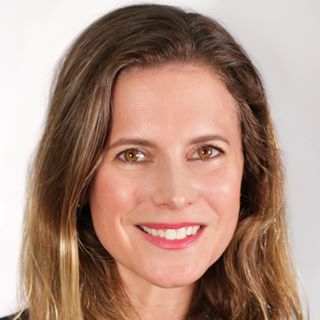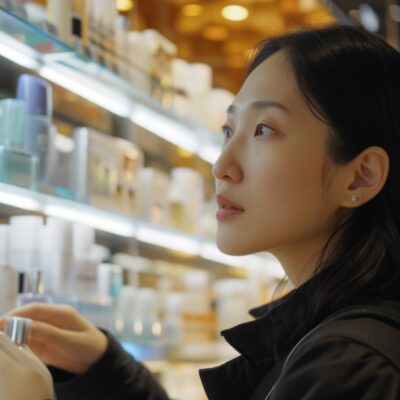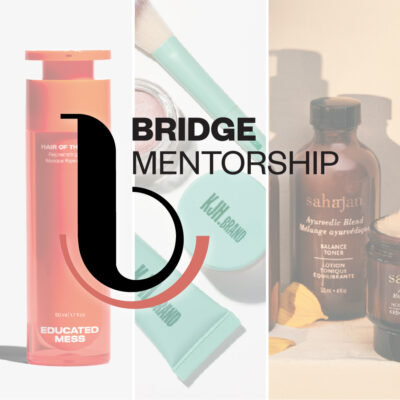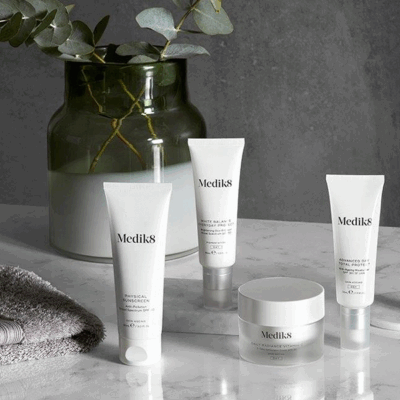
How Indie Beauty Brand Founders Hone Their Retail Pitch
In this edition of Beauty Independent’s ongoing series posing questions to beauty entrepreneurs, we ask 19 brand founders and executives: How did you hone your retail pitch?
- Maya Crothers Founder, Circcell
Our pitch has been refined through years of repetition and feedback. Non-verbal communication during a face-to-face tells you if you've got their attention. You can just feel it. You can also feel when you've lost them. This type of feedback is constantly going into our messaging. Of course, we tailor for our audience.
We focus on our natural ingredients, and our commitment to clean with some audiences, while medi-spa type environments are more interested in performance, so we focus on our ingredient technologies and how they relate to the various biological functions of the skin. And, of course, investors care deeply about the brand story and products, but they are extremely interested in strategy, execution, financial performance and growth, so we expand or contract various parts of the pitch based on who is listening.
- Melissa Boerema Director of Marketing, InstaNatural
Our retail pitch is something that is always being refined. Over time, we have developed strong storytelling components that serve as the foundation for every introductory pitch. Topics like who we are, how we got started and what we stand for are always important to share for the retailer to get a sense of our brand identity.
However, the information that follows is carefully crafted for each retailer. We do in-depth research to uncover what elements the retailer considers important and what are their core values. What competitors do they already stock, and how are we different? We try to gather as much research as possible to paint the most vivid picture as to why our brand is a must-have for their portfolio and for their shopper.
In addition, since we are an e-commerce-born brand, we are able to harvest key insights from historical order data to drive further discussion and storytelling. Both e-comm and brick-and mortar-retailers appreciate facts, like how many units we sold in a lifetime, number of five-star reviews online and repeat purchase rate. Product reviews in particular are very important since they help to build brand awareness and drive purchase in stores as well. With this data, over time, we have built a catalog of talking points that we can use to tailor our pitch to each retailer.
- Joan Sutton Founding Partner and CEO, 707 Flora
When explaining my brand to various retailers, it can change depending on who the buyer is and their knowledge and experience of CBD and skincare. For example, when I sell into a CBD retail store, they already have a good understanding of CBD, and I am more focused on the physiology of skin itself and the role of CBD in the formulations.
Whereas, when I am speaking with an aesthetician or spa owner, they may not have as much experience with CBD, so I speak more about the science of CBD and other cannabinoids, and how they play a decisive role in our skin care. Either way, you have to know your product well enough to explain it in the most simple terms, and be ready to get scientific and complex for those who want to dig deeper.
- PAULA PULVINO Founder, Villa of the Mysteries Perfume
I honed my pitch by speaking to customers at pop-ups, flea markets, fairs, etc. Most people who go to these events haven’t heard of your brand, so it’s up to you to sell it to them in real time, and you have about 15 seconds to successfully pitch a product before they lose interest, similar to the "Shark Tank" experience, except on a micro level. Having to do this over and over for each potential customer really instills a discipline into your pitch. You get to see in real time what’s resonating with the customer and what’s not, and you can adjust on the fly.
Once I get the customer to try the product, they want to know more, so that gives me the opportunity to expand on my product story for another 60 seconds while I have them try a few of our fragrances. This process has helped clarify what my product’s value proposition is and how to hone my message to best appeal to customers. It also doesn’t hurt that I faithfully watch "Shark Tank" and have learned from entrepreneurs on the show what a succinct, powerful pitch should look and sound like.
- VALERIE OBAZE Founder and CEO, R&R Luxury
We have one template retail pitch which we edit each time we send it out to a different store or platform. I think it’s extremely important to tailor the document based on the potential new client you are sending it to.
For example, if I’m sending a pitch to a large department store, it will differ from a smaller natural products boutique as the two stores are looking for completely different things. Some retailers specify on their website the exact information they want to receive, which makes it simple as you don’t have to overload them with excess information they did not request.
It took quite some time to perfect our template pitch. I was able to learn some tips about what to include from research online. As well as your products and pricing, it’s great to include information on your customer profile and the brand’s core values. It’s important that the values of the brand are in line with the store you are targeting.
- Ido Magal Founder, Lavido
I always tell my story of how I started the brand, instead of a formal sales pitch. This is who we are. For many years, this pitch evolved as I saw what made people get excited during our conversation. I look at their eyes, their emotional reaction, what they are engaging with while I’m sharing my story.
When communicating online, I describe emotions behind the story. Customers need to be inspired through description as well, so they can understand the feeling and smell of the products without actually interacting with them.
- Paayal Mahajan Founder, Essential Body
These days there are tools, workshops and experts who will all have an opinion on your pitch, your language, and how you position your brand. I'm still prone to launching a juggernaut of words. What passionate entrepreneur isn't? But, with time, you get better. You know what you've created, and you understand how to explain it to folks, the short version and the long version.
For me, a good pitch is really just about staying true to myself. People see through fluff so easily. Why even bother playing that game? I didn't hire an agency or expert to develop my brand language. I wrote everything myself, from my pitches to my product descriptions and how-to's. I wrote and rewrote, and kept honing it all myself.
The language I use, whether online or offline, is consistent. When I'm training retail staff on how to sell my line, that consistency helps them to retain key brand differentiators. My clients relate to my brand because they see that consistency and authenticity. Of course, one has to be able to adapt to different audiences, but the gist of the messaging and certain keywords have to ultimately become synonymous with your brand.
- Amber Fawson Co-Founder, Saalt
Our retail pitch is a constant work in progress as we continue to grow and strive to be a true solver of problems and meet real needs. Pitches differ, not necessarily from brick-and-mortar to online, but between retailers who currently carry a cup to retailers who don't.
Most of the time, with retailers who do not carry our category, their decision comes down to us sending a sample, so they can try it themselves. Once the buyer becomes a cup convert, they are more likely to see how important it is to give their customer base this option.
- Luisa Wiesche Founder and Business Director, De Lilou
Perfecting a pitch requires a lot of training, but you learn it mostly by doing. It can definitely differ from place to place, as the approach varies according to the location of a physical store and its clientele.
The pitch also differs if you have an in-person meeting (the best shot), if you have a telephone call or even if you just write an e-mail. It's important that your brand is the right fit for the retailer you are pitching, that you know exactly what your point of differentiation is, and that you keep following up without being annoying.
- Michael Leahy Co-Founder and CEO, Busy Beauty
Nothing quite like trial by fire. They say it takes 10,000 hours to master a skill. If you are pitching to fundraise for your business, you will be pitching again and again to hundreds of investors. This will quickly teach you what peaks investor interest and what doesn't. If you are just getting started, pitch first to advisors, professors, colleagues or anyone else who will listen. They will provide you the initial feedback you need to avoid vital mistakes.
- Lourdes Gaudiano Co-Founder, Luly Gaudiano
I did a lot of research before writing my pitch. I wanted it to be perfect, and I came up with a core pitch, where I highlighted the benefits of my products, but I do change things depending on whom I’m going to pitch.
For example, the way I introduce the brand, I do it a bit more formal or informal or highlight that is made with green energy if it’s for a green shop. I talk about my story as a Panamanian building a cosmetic brand in Switzerland, always making sure that it’s short enough not to bore potential buyers.
- DANIELLE CUCCIO CEO, Cuccio Somatology
My retail pitch is so fun for me to tell. It's my story. It's my passion, so I love telling it again and again. Even if I have to say it five times in one day, I believe a brand is as good as it's story. I don't really change this story when I'm pitching to online versus brick-and-mortar. I sometimes might bring out another part of my story if I'm talking about a certain product that might be better for the store or company. That's where the story can change.
I might go into why I love detox baths and how they help me in my life, the amazing benefits, etc., whereas if I'm talking about another product, I might have an entire different story for that product. But it all boils down to the same story: Why I do what I do and how it came to life.
- Kara Soule CEO and Co-Founder, Verdant
Our product is our pitch. We’ve always believed that if we take great care with our ingredients, our products will stand on their own, so we’ve worked extremely hard to translate an incredibly uncertain, complex industry into certain, simple and reliably superior ingredients. And retailers have noticed the difference in the appearance, smell, taste and effectiveness of our products.
In a sea of misinformation and mistrust, retailers are thankfully becoming better informed and more discerning about their CBD product partners, which has helped us rise above the noise. We’re always looking to partner with retailers who, like their customers (and ours), want the real thing, made by people who have taken the time to do it right. So, when we say we are a “premium ingredient focused company," our product says, “That’s true. It’s not just a line.”
- Dave Wongk Founder and CEO, Pure Tropix
I love the study of psychology, what causes people to buy and how certain products become ingrained into our daily lives. So, when I develop my pitches, I like to know who my audience is, that way I’m able to take a psychological approach in getting them to buy, whether it’s pain points or social proof.
Another amazing strategy I love to use is to nurture your best customers and followers. They will turn into evangelists. They will turn into your street team of people who tell everyone to buy your products.
- Glenny Legendre Executive VP Sales and Marketing, LaFlore Probiotic Skincare
We started by crafting a demographic profile and then hit the streets, so to speak, to understand our targeted customer. We haunted their haunts, checked out their social channels, shopped their stores and made purchases on websites we thought they would frequent. By living the life of this profiled customer, we got a sense of what we thought would appeal to them. We used this information to dial into to how we could best serve our customers in a variety of channels and fill an empty niche in the market.
- Dr. Shuting Hu Founder, Acaderma
Aside from attending various conferences and workshops to learn better ways to tighten up my pitch, an unconventional thing I also did was watched a lot of YouTube videos of brand founders speaking about their journey through entrepreneurism. I found it really helpful to not only listen to their advice but to see how confident they were when they’d speak about their brand and products.
- Rozy Kriston Founder, AMPERSAND
When participating in the Indie Beauty Expo, we had the opportunity to interact with a variety of buyers and retailers. It really helped us understand the best approach to our pitch.
Buyers offered real-time advice and constructive criticism that allowed us to hone our pitch quickly. We learned that a lot buyers have different needs and wants, so we’ve adapted our pitch to be very flexible and alter it slightly according to the individual buyer/retailer.
- JENNIE FRESA Founder and Owner, Copal Clean Beauty
The Ted Talk by Simon Sinek, “Start With Why” is such an incredible watch for anyone who needs to shift their mindset and perfect their pitch.
For me, discovering my WHY has helped me leverage my uniqueness and get more comfortable telling my story. I always remind my team, Facts Tell, Stories Sell. I’m not sure where I heard the phrase, but it makes so much sense and it is definitely the approach I’ve adopted in our store.
And, of course, it’s mostly about practice. I practice in store with my clients, with my team, and at home with my husband. Sometimes I even practice telling the trees outside when I’m on a walk! With a pitch, you only have one time to get the message right so you want to have it down.
- Ada Ooi Founder, 001 Skincare London
We tweak our pitch focus depending on the company we're pitching to. Pitching to a retailer and spa can be different. When pitching to a retailer, we emphasize the products that have been heavily marketed or talked about (by who) on both on/offline media, and how we're going to keep the marketing momentum.
Pitching to spas. While marketing track record is important to demonstrate brand credibility, we place more emphasis on how we can use our practical experience and spa expertise to design exclusive treatments for their specific clients with our product range.Hero products can differ depending on climate. In Asia we place our pitch focus on our gel-based products which have a light and matte texture yet can be built on should the customers would like to layer them. In Europe we do have to include our oil serum and thick cream when pitching.
Different ethnicities with different facial features can also affect how we pitch. An example would be for our eye products. Caucasians have very defined features with high nose bridge and hollow eye ball sacks. Blood circulation can stagnate at the tip of the eyes, causing purple-darkness, while customers with olive or darker skin have dark circles across the whole eye area. And, if we're speaking to East Asian like Chinese or Japanese, although dark circles can be a concern, their top of mind would be puffiness and droopiness on the upper eye lid. When you've got multi-functional products, you need to tailor them to who you're talking to.
If you have a question you’d like Beauty Independent to ask beauty entrepreneurs, please send it to editor@beautyindependent.com.






Leave a Reply
You must be logged in to post a comment.